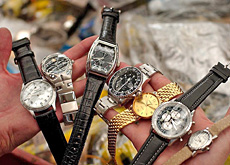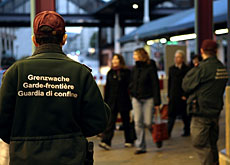Customs poised to pounce on fake goods

People arriving in Switzerland wearing fake watches could have their illicit goods snatched away under new customs powers that come into force from July 1.
For the first time, border officials will be able to confiscate counterfeit products intended for personal use, in addition to existing powers to seize items smuggled into the country for resale.
The illegal counterfeit market costs the Swiss economy an estimated SFr2 billion ($1.79 billion) a year and the watchmaking industry alone some SFr800 million ($718 million).
The recent amendment to the Swiss patent protection laws closed a loophole that allowed individuals to enter the country with fake goods they had bought for themselves.
Similar laws exist in Italy and France, but Switzerland will stop short of trying to prosecute people as it would be too difficult to prove that they had knowingly bought illegal goods.
Jean-Daniel Pasche, president of the Federation of the Swiss Watch Industry, welcomed the move as an “important breakthrough”.
“The damage to the reputation of Swiss watches is the same if one person smuggles in 200 watches or 200 people bring in one fake each,” he told swissinfo.
“We are active in many countries, asking them to pay attention to the counterfeit problem, but we must also set an example in Switzerland too.”
The federation is working closely with customs officials to train officers to spot counterfeit watches. It also has a specialist team that can analyse suspect items in detail to determine whether they are fakes or not.
Another area that keeps the industry busy is trying to tackle the sale of fake watches over the internet.
Made in China
Targeting individuals with fakes at the Swiss borders would not stop the counterfeit market in its tracks but will be another important step towards protecting the integrity of the official industry, Pasche added.
Most counterfeit products originate from Asia, particularly China, which is an important market for the tourist industry. But the Swiss Tourist Board does not think that more stringent border controls will result in problems for visitors from this region.
It is believed that most of the people who bring in fake goods are the Swiss themselves, who buy them abroad to escape the high costs of the home market.
“Travelling to Switzerland is a lifetime dream of most Chinese and they want to prove that they have come here by taking home an authentic Swiss brand,” tourist board spokeswoman Edith Zweifel told swissinfo.
Chinese guests are the third biggest spenders in Switzerland, splashing out an average SFr450 per person per day during their visit, Zweifel added. Only tourists from the Gulf region and Taiwan spend more.
In January of last year the Swiss authorities joined forced with business groups to launch a “Stop piracy” anti-counterfeiting campaign aimed at raising public awareness of the problem.
While few fake products are manufactured in Switzerland, the country has been increasingly used as a transit hub for counterfeit goods between Asia and other regions and the European Union.
swissinfo, Matthew Allen with agencies
The Swiss watch industry exports around 25 million timepieces every year.
In addition, some five and a half million watch parts, such as springs, are exported annually.
The combined trade is worth nearly SFr14 billion ($12.57 billion) each year – making Switzerland by far the leading watch exporter in the world.
At the same time 40 million fake Swiss watches are produced around the world.
70% come from Asia, mostly from China.
The piracy of brand products causes an estimated SFr2 billion in damages to the Swiss economy each year.
Trademark counterfeiting affects the watchmaking, pharmaceutical and medical sector, as well as the food and tobacco industry. Medical appliances, optical products, furniture and fashion items are also illegally copied.
The World Intellectual Property Organization (Wipo) estimates the global economic costs of illegal trade to be more than $100 billion (SFr125 billion). But other estimates have put the cost at four times this amount.
According to the European Union, 84% of goods seized by customs officials originate in China. The Swiss watchmaking industry says China is the number one producer of fake timepieces.

In compliance with the JTI standards
More: SWI swissinfo.ch certified by the Journalism Trust Initiative











You can find an overview of ongoing debates with our journalists here . Please join us!
If you want to start a conversation about a topic raised in this article or want to report factual errors, email us at english@swissinfo.ch.